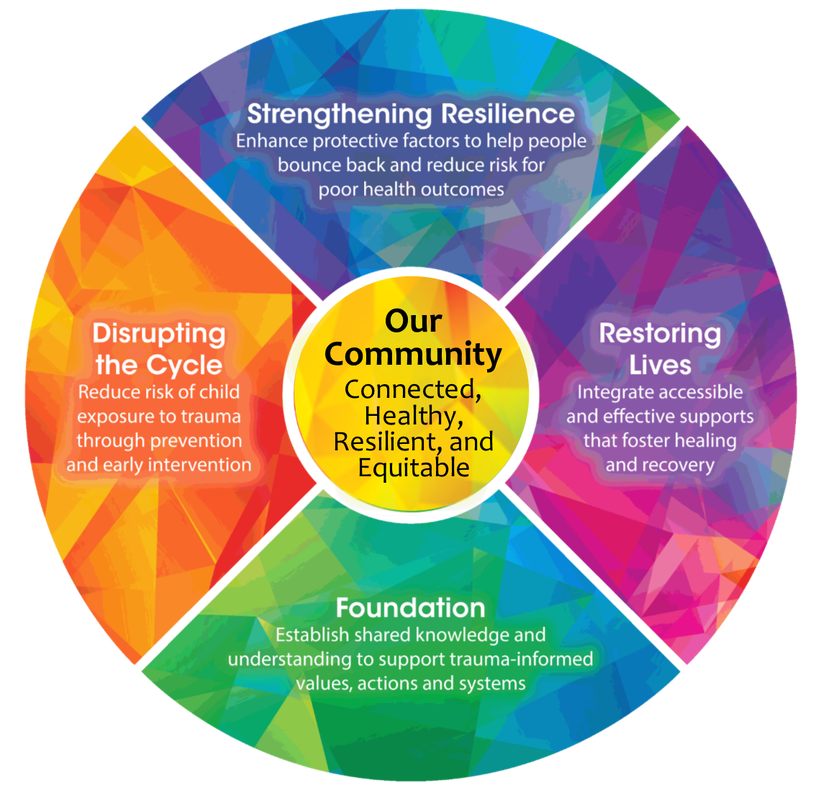|
To create a connected, healthy, and resilient community, we are building a foundation of common language and shared knowledge around Adverse Childhood Experiences (ACEs), trauma-informed care, and resilience-building. Our RTIC Foundation Training is the entry point to this effort, where participants learn about our shared community effort, the impact of trauma, the role of resilience, and the importance of having empathy skills.
|
Foundation TrainingThe Foundation Training introduces the RTIC community effort, as well as the basic concepts it is based on. It is open to the community, but has primarily been marketed to practitioners to date. This 3-hour session begins with a screening of the film Resilience: The Biology of Stress and the Science of Hope, followed by group discussion and further education about the role of resilience in reducing the impact of trauma. Participants also learn more about building empathy skills, both professionally and personally, as a means to strengthening resilience.
The Foundation training is designed to encourage community members, especially those working for organizations, to become RTIC Champions, who commit to continuing the RTIC effort in their organizations and community work. All Foundation training sessions end with a facilitator training for those Champions interested in leading the training in their own organizations. Resources for those wishing to facilitate their own training are here. |
Resilience: The Biology of Stress and the Science of Hope KPJR Films - Trailer |
Next Foundation Training Opportunity:
Thursday, February 22, 2024
1:30-4:30 PM - This session will be in-person only.
Health Science Center, 1300 Badger St., La Crosse WI
1:30-4:30 PM - This session will be in-person only.
Health Science Center, 1300 Badger St., La Crosse WI
Future Dates:
May 2024
August 2024
November 2024
May 2024
August 2024
November 2024
Creating a Common Language: Some Definitions
Adverse childhood experiences
"In the mid-1990s, the CDC and Kaiser Permanente discovered an exposure that dramatically increased the risk of 7 out of 10 leading causes of death in the US." – Nadine Burke Harris, MD, MPH, FAAP
The exposure was identified as childhood trauma. Adverse Childhood Experiences (ACEs) are difficult experiences during childhood that affect our health and well-being. Witnessing violence, parental divorce or separation, caregiver addiction or mental illness, physical and emotional abuse or neglect are some of the many examples.
ACEs are often at the root of dozens of health and well-being outcomes, and are common in virtually all populations. ACEs are a strong predictor of future health issues and can even influence adult health. The science is clear; more ACEs lead to an increased risk for poor mental and physical health outcomes. According to the CDC, ACEs have been connected to over 40 poor health and well-being outcomes in adults.
The exposure was identified as childhood trauma. Adverse Childhood Experiences (ACEs) are difficult experiences during childhood that affect our health and well-being. Witnessing violence, parental divorce or separation, caregiver addiction or mental illness, physical and emotional abuse or neglect are some of the many examples.
ACEs are often at the root of dozens of health and well-being outcomes, and are common in virtually all populations. ACEs are a strong predictor of future health issues and can even influence adult health. The science is clear; more ACEs lead to an increased risk for poor mental and physical health outcomes. According to the CDC, ACEs have been connected to over 40 poor health and well-being outcomes in adults.
trauma-informed care
Trauma-Informed Care (TIC) is a perspective shift that promotes recovery and acknowledges the role of trauma in someone's life. A trauma-informed approach involves a profound cultural shift in understanding challenging behavior, health and social problems. When we understand the role of childhood trauma on health and well-being across the lifespan, behaviors and health conditions are viewed different, staff respond differently and there is a change in approach for delivery of services. Adopting a Trauma Informed approach is not accomplished through a single checklist, program, or intervention. Instead, Trauma-Informed Care requires constant attention, caring awareness, sensitivity, and possibly cultural change at the organizational level.
The Substance Abuse and Mental Health Administration (SAMHSA) provides four Rs to guide trauma-informed programs, organizations and systems:
The Substance Abuse and Mental Health Administration (SAMHSA) provides four Rs to guide trauma-informed programs, organizations and systems:
- Realize the widespread impact of trauma and understand potential paths for recovery;
- Recognizes the signs and symptoms of trauma;
- Responds by integrating knowledge practices, procedures and policies, and
- Activity works to Resist Re-traumatization.
resilience
By fostering resilience, we can reduce risk and support recovery when the right supports are in place. Resilience is the ability to bounce back and with appropriate support and help, people can heal and thrive despite past experiences.
Resilience can be built through:
Resilience can be built through:
- Healthy and supportive relationships
- Taking care of ourselves
- Asking for help when we need it
What comes next? Become a Champion
Looking for more information or want to schedule a custom Foundation training? Contact Us.

